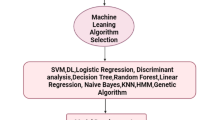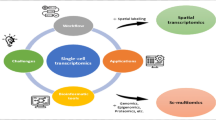Abstract
Mutation detection is fundamental throughout biology, but especially so in medicine and medical research, particularly in gene discovery and cancer diagnostics. Current methods are unsatisfactory due to a range of reasons, but particularly due to cost and lack of convenience. The current methods are reviewed and their advantages and disadvantages discussed. The high profile chip technology whilst making an enormous impact in expression studies is more problematic for mutation detection, especially for unknown mutations and the problems are discussed. Finally, once mutations are discovered they need documenting accurately and the efforts of the Human Genome Organisation mutation database initiative due this direction are discussed.
Conclusion Current methods of mutation analysis, although unsatisfactory, are reviewed and the impact of new technologies assessed.
Similar content being viewed by others
Author information
Authors and Affiliations
Rights and permissions
About this article
Cite this article
Cotton, R. Methods in clinical molecular genetics. Eur J Pediatr 159 (Suppl 3), S179–S182 (2000). https://doi.org/10.1007/PL00014396
Issue Date:
DOI: https://doi.org/10.1007/PL00014396




